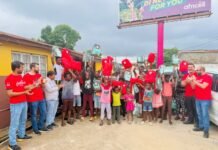By Abubakarr Harding
Madam Mari Shojo, the World Bank Senior Education Specialist has stated that Sierra Leone is the only country in Africa to have digitized the Annual School Census and commended the Ministry of Basic and Senior Secondary Education in that direction. She made that statement during the launch of the 2021 Annual School Census (ASC).
The ASC Report was launched on Wednesday 24th August 2022 at the Ministry’s Conference Hall, New England Ville Freetown.
Madam Shojo reaffirmed the World Bank’s support to data collection because the census shows mapping of where schools are located and what the challenges are, noting that the data is very important for local partners and it can be utilized globally.
While launching the ASC Report and also the application that enables the public to interact with the data, the Minister of Basic and Senior Secondary Education, Dr Moinina David Sengeh regarded the ASC Report as something he always looks forward to especially as the Chief Innovation Officer.
“Every child counts. While access, equity and completion are the prime metrics of the Government in the FQSE program, more variables need to be monitored and tracked. Our objective is to increase the number of children getting access to school irrespective of location, disability, economic status, cultural practice, etc. building and refurbishing schools; providing teaching and learning materials and furniture; supporting school feeding in pre-primary and primary schools in 14 districts; fees/subsidies paid to schools; and the payment of examination fees for all public exams to the West African Examination Council (WAEC). Government has developed and approved the radical inclusion policy to give access to all including pregnant schoolgirls and children with disabilities,” he said.
The Director of Policy and Planning, Madam Adama Momoh, said the ASC report gives an analysis and interpretation to inform national understanding of trends in school development and enrolment growth, numeracy, retention, literacy, transition and multi-level performance.
She said this also informs the actions to support the free quality school education program in the distribution of teaching and learning materials, furniture, payment of fees/subsidies to schools, providing school feeding and the general growth path.
“This census is conducted in collaboration with professional and technical institutions with proven capacities to handle large scale data collection and processing. Statistics Sierra Leone, the National Civil Registration Authority (NCRA) and Local Councils played key roles in the data collection process together with the Teaching Service Commission and Civil Society Organizations to ensure credibility in the data production,” she said.
While chairing the event, the Chief Education Officer (CEO) Professor Yatta Kanu regarded the ASC report as one of the most important documents coming from the Ministry, noting that it is the most referenced document by MBSSE partners.
According to her, the report is very good for a Ministry that prides itself on radical inclusion, commended the team for putting together the document.
Trend analysis of the ASC between 2018 and 2021 depicts the number of schools having increased by 13 percent from 10,747 schools in 2018 to 12,168 schools in 2021. Number of schools approved to operate as schools increased by 78 percent between 2018 and 2021 from 4,872 to 8,676 schools. Also, public schools receiving financial and material support from the Government of Sierra Leone (GoSL), increased by 56 percent between 2018 and 2021 from 4,387 to 6,829 schools.
Pupil’s enrolment in schools over the last four years had increased by 37 percent from 1,982,475 pupils to 3,131,440 pupils between 2018 and 2021. Girls’ enrolment in schools has continued to increase at all levels and has almost drawn parity with boys’ enrolment at the senior secondary school level.
Further, the trend of classroom registered teachers in schools between 2018 and 2021 has shown a steady regularization of teacher roll. The number of teachers in classrooms had decreased by 8 percent from 87,625 teachers in 2018 to 80,744 teachers in 2021 due to a direct policy intervention that removed ‘ghost’ teachers from the payroll. At the same time, the number of qualified teachers in schools has increased by 11 percent between 2018 and 2021 from 48,560 to 53,885. The increase in pupils’ enrolment during this period is not linear with the increment in teacher numbers leading to increasing pupils to teacher ratio and also pupils to qualified teacher ratio.
Other key findings of the 2021 ASC: a total of 12,168 schools across the country were enumerated with 3,131,440 pupils enrolled and 80,744 teachers. Out of the 12,168 schools covered in the ASC, more than two thirds of them are public schools 10,124 (83.3%) compared to private schools 2,044 (16.7%). More than half of the schools (7,429) in Sierra Leone, accounting for 61.0% are primary schools, followed by pre-primary schools 1,984 (16.3%), 1,931 Junior Secondary Schools (15.7%) and 824 Senior Secondary schools (6.7%).




